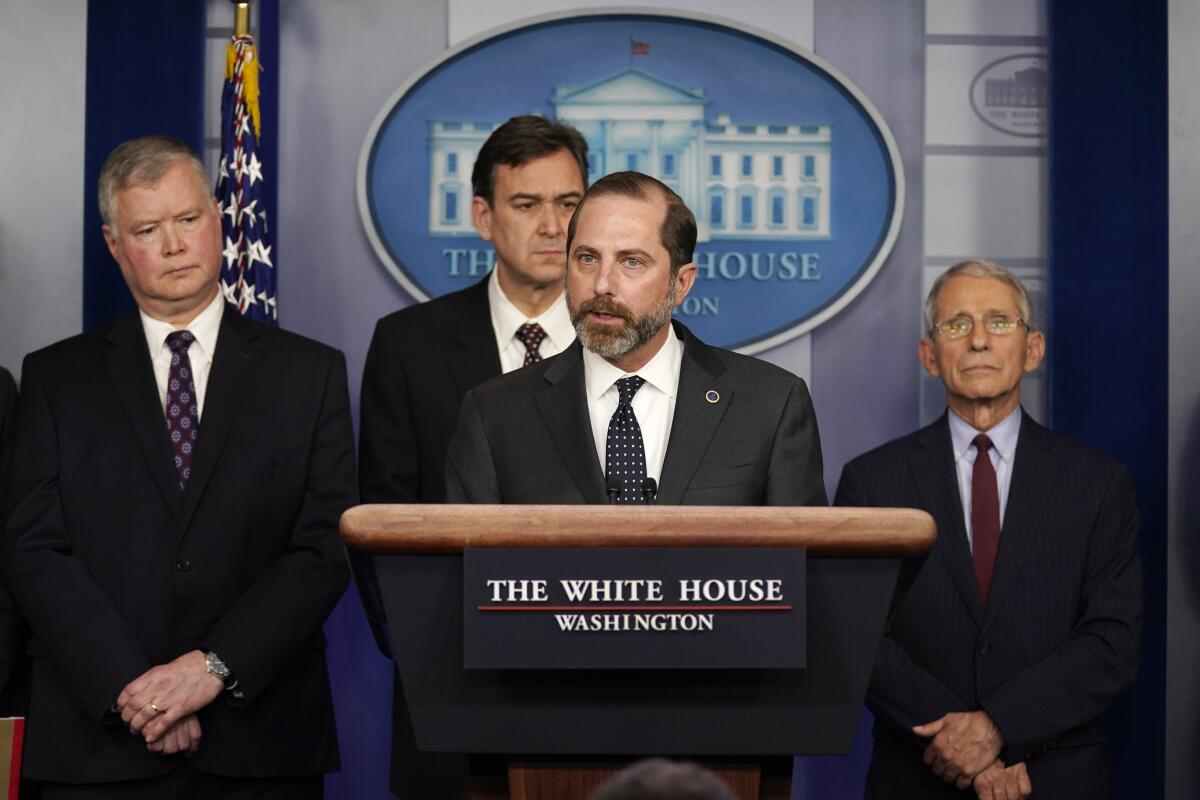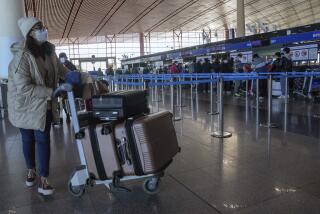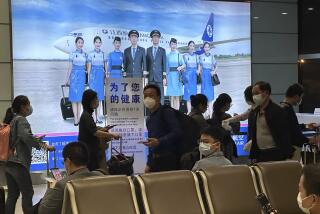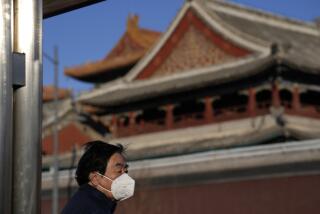Trump administration declares health emergency over coronavirus; airlines cut service to China

- Share via
WASHINGTON — Growing global health concerns over the coronavirus outbreak prompted the Trump administration Friday to declare a public health emergency, imposing unusual restrictions on people traveling from China to the U.S. as the world’s largest airlines dramatically cut flights to and from China.
Starting Sunday, foreign nationals who recently visited China won’t be allowed to enter the U.S., and American citizens returning from mainland China will be subject to 14-day quarantines.
Although public health officials continue to describe the risk from the virus as “low,” government officials and private businesses have begun to take more dramatic steps in the past few days to try to get a handle on an outbreak that has sickened more than 11,000 people on four continents and claimed more than 250 lives. Only a handful of cases have been confirmed in the U.S.
Growing anxiety over the outbreak and its potential affect on the global economy helped trigger a drop in the Dow Jones industrial average of more than 600 points, or about 2%, Friday. The Standard & Poor’s 500 index erased its 2020 advance as traders remained on edge over the impact of the deadly disease.
In California, the Centers for Disease Control and Prevention ordered a quarantine Friday for 195 Americans from Wuhan, China, who were evacuated to March Air Reserve Base in Riverside County after fleeing the coronavirus outbreak. The quarantine will last 14 days — the incubation period for the virus — from when the plane left China, CDC officials said.
The mandatory quarantine is the CDC’s first in more than 50 years.
In Santa Clara County, a man tested positive for the virus following his Jan. 24 return from Wuhan and Shanghai , according to Dr. Sarah Cody, director of Santa Clara County’s Public Health Department. He became the first confirmed case of coronavirus in the Bay Area, the third confirmed case in the state and seventh in the country, according to the CDC.
Another 191 individuals across the country are being monitored for possible exposure, health officials said.
The man has since self-isolated at his home, leaving home twice to seek medical care. Officials are contacting individuals who may have come into contact with the man.
Cody stressed that the new case does not increase the public’s risk of contracting the virus.
“We do not have evidence to suggest that the novel virus is circulating in the Bay Area, Santa Clara County or Northern California,” she said. Despite concerns over the spread of coronavirus, Cody said people are more likely to become ill from the flu. According to federal data released Friday, influenza has killed approximately 10,000 Americans since October.
Speaking from the White House, Dr. Robert Redfield, director of the Centers for Disease Control and Prevention, tried to reassure the public while announcing new steps to help prevent the virus’ spread.
“The risk to the American public at this time is low,” he said, acknowledging that officials continue to learn more about the virus every day.
The World Health Organization had announced Thursday that the fast-spreading outbreak had become a global “public health emergency.” But in doing so, officials emphasized that no restrictions on international travel or trade were necessary at that time.
But under the flight restrictions announced Friday, people less than 14 days removed from traveling in Hubei province, the epicenter of the outbreak, will be subject to a two-week quarantine at as-yet-unidentified facilities in order to prevent the virus from spreading further, officials said. Exceptions will be made for immediate family members of American citizens and permanent residents.
Flights from China to the U.S. will also be “funneled” to seven airports where enhanced public health screenings will be required for Americans returning from China. Those airports are Los Angeles International, San Francisco International, New York’s JFK, Chicago’s O’Hare, Honolulu International, Seattle-Tacoma International and Atlanta Hartsfield-Jackson International.
In 2014, passengers from Ebola-stricken countries had to fly to five specified U.S. airports for testing.
The travel industry has expressed concern about a growing financial hit from coronavirus fears.
“We applaud the steps being taken to keep the U.S. safe,” said Roger Dow, chief executive of the U.S. Travel Assn., “but we urge that precautions are continually vetted against the latest public health data and guidance from top experts, and evolve as the threat level shifts.”
Meanwhile, two of the world’s largest airlines on Friday announced a temporary halt to flights to mainland China, with American Airlines, the largest global carrier, immediately suspending all flights to and from mainland China through March 27. Delta Air Lines said it would halt all flights to mainland China through April 30 but would begin the suspension starting Feb. 6 to provide service to travelers who want to leave China.
American and Delta had previously reduced service to mainland China’s largest cities, including Shanghai and Beijing but announced more drastic cuts in service following a new travel advisory Thursday from the State Department about the health risks of travel to China.
United Airlines suspended flights starting Feb. 6 between major U.S. airports and Beijing, Chengdu and Shanghai. It will continue to operate a daily flight between San Francisco and Hong Kong. The Chicago-based carrier had previously said it would begin cutting flights to China on Feb. 8.
The State Department travel advisory came about a week after the agency ordered all nonemergency U.S. personnel and their family members to leave Wuhan, the epicenter of the outbreak. The travel advisory was the strongest issued so far by the department, saying Americans should not travel to China and those already in the country should “consider departing using commercial means.”
When the World Health Organization deemed the outbreak on Thursday a “public health emergency,” it said it “does not recommend any travel or trade restriction based on the current information available.”
Other carriers, including including British Airways and Asian budget carriers Lion Air and Seoul Air, suspended flights to China earlier in the week, while several carriers such as Finland’s Finnair, Hong Kong-based Cathay Pacific and Singapore-based Jetstar Asia reduced the number of flights.
Nearly all of the carriers said they plan to waive reservation change fees so that passengers can rebook flights for a later date.
Times staff writer Karen Kaplan contributed to this story.
More to Read
Sign up for Essential California
The most important California stories and recommendations in your inbox every morning.
You may occasionally receive promotional content from the Los Angeles Times.













